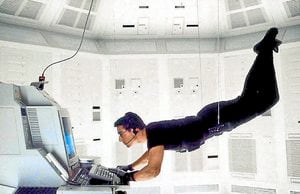Budget was Mission Impossible says Nigel Hastilow
Philip Hammond is no Tom Cruise but this Budget was always going to be ‘Mission: Impossible’.

His mission, which he chose to accept, was to rescue his own career, the Prime Minister’s Government, the Conservative Party’s chances of winning the next election, the hopes for a successful Brexit and the nation’s finances.
It was never going to happen. Despite all the hype that this was to be the moment when the Tories turned things round, that this was the most important moment since the General Election and that there would be good news for everybody, Mr Hammond is not cut out to be an all-action hero.
He was on a hiding to nothing, bound to disappoint.
And, for a Chancellor who make great play of the fact that he is promising ‘more maths for everyone’, there was considerable scepticism over whether his sums really add up.
Mr Hammond’s task was not made easier by the fact that the independent Office for Budget Responsibility says the economy is not likely to grow as quickly as he expected earlier this year.
Growth was advertised to be two per cent a year until 2020, now it’s 1.3 per cent rising maybe to 1.5pc. And growth, of course, means more tax revenues for the Chancellor. Without that money, he has to put up taxes, increase borrowing or cut spending.
That’s been the challenge for chancellors since the banking disaster a decade ago and we are still not out of the woods.
Yet Mr Hammond did have a positive story to tell – especially about jobs. For as long as anyone can remember, unemployment has been the biggest single indicator of Britain’s economic health.
Every time a company closes a factory or opens an office, the big question is: ‘How many jobs?’
Mr Hammond’s biggest pre-Budget gaffe was to claim that there were ‘no unemployed people’ left in Britain.
It’s not true, unemployment still stands at 1.4 million, but since David Cameron became Prime Minister in 2010, as Theresa May told the Express & Star, no fewer than three million more people are in work.
That’s a huge increase in employment. But we have come to take this for granted so the fact that a record 32 million people have jobs is taken for granted; instead employers worry about skill shortages and productivity levels.
Of course, critics say all these jobs are low-paid, part-time and insecure not to mention that most of them are filled by immigrants, largely from Eastern Europe.
In the high-tech, digital future, Mr Hammond wants us all to enjoy ‘good-quality, well-paid’ work. But that won’t win him much personal job security.
Instead, he seems to be relying on the housing market to boost his own ratings, Mrs May’s and the Conservatives’.
Abolishing Stamp Duty up to £300,000 for first-time buyers was the headline announcement and it will go some way towards getting more young people onto the housing ladder.
Critics claim the end result will be higher prices but, along with other measures to boost the supply of new homes to a huge 300,000 a year, it’s more likely they could actually fall over time, though wait for the cries of pain if that does happen.
Mr Hammond distributed gifts as if he were playing a benevolent Father Christmas, with more money for the NHS, a promise to boost nurses’ pay, railcards for the under-30s, concessions on universal credit and support for small businesses.
And few people could argue with many of the tougher measures like taxes on polluting diesel cars, plastic packaging and the ‘white cider’ beloved by Scottish drunks.
With such great expectations hanging on Mr Hammond’s modest performance, there was never any hope it would suddenly transform anybody’s fortunes, political or financial.
If the Government had a majority; if it hadn’t just lost two Cabinet ministers; if there was no threat of losing at least one more; above all, if it were agreed on Brexit, the great issue of the day, this would have been judged a reasonable Budget.
In normal times, experts would examine the small print for days drawing attention to flaws, inconsistencies and hidden traps for the unwary. But these are not normal times.
Indeed, the biggest item of spending to land on the Chancellor’s desk this week scarcely got a mention – the Government’s decision to double its ransom payment to the EU from £20 billion to £40bn.
Mr Hammond said he was setting aside an extra £3bn for Brexit ‘preparations’ but made no mention of the huge sum the Cabinet has decided to offer Brussels in exchange for this country’s freedom.
The Chancellor spent his hour fiddling about with trivial sums of money like his tax increase on private jets or his £600 bribe to encourage pupils to take maths A-level but couldn’t find the time to discuss the biggest pay-out of all.
It turns out his Budget was not so much ‘Mission: Impossible’ as ‘La La Land’.





